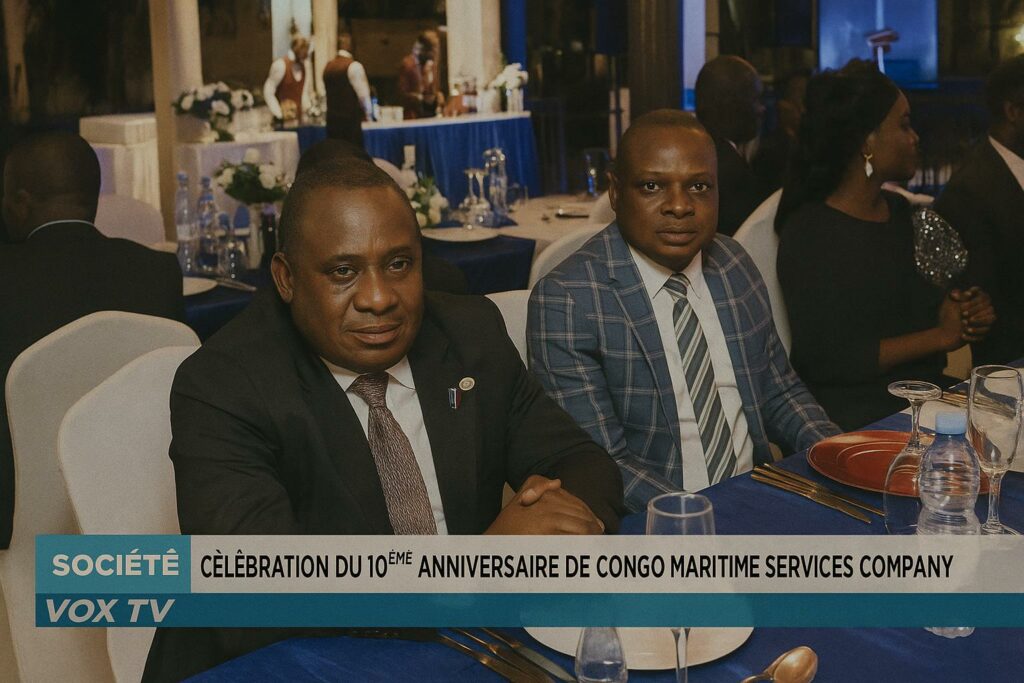A decade of maritime resilience in Congolese waters
The soft equatorial breeze drifting across the quays of Pointe-Noire carries with it the unmistakable sound of tugboats and container cranes, a symphony that Congo Maritime Services Company (CMS) has learned to orchestrate with growing dexterity since its incorporation in 2014. From a modest shipping agency serving coastal cabotage, CMS has expanded into a multi-faceted service provider encompassing vessel husbandry, offshore logistics, customs facilitation and nautical assistance. Its anniversary, commemorated in early May at the city’s convention centre, provided an apt moment to reflect on how a national operator can anchor itself in an industry often dominated by global behemoths.
Tandem with state policy and the National Development Plan
CMS’s trajectory coincides with Brazzaville’s successive development blueprints that have steadily repositioned logistics as a pillar of economic diversification. The current National Development Plan 2022-2026, endorsed by President Denis Sassou Nguesso, singles out the maritime corridor as a vector for value addition, import substitution and regional trade facilitation (Ministry of Planning, 2022). By providing towage, pilotage coordination and break-bulk handling, CMS forms an operational bridge between state-owned Port Autonome de Pointe-Noire and international carriers, thus translating governmental macro-objectives into day-to-day port productivity gains.
Pointe-Noire: from oil enclave to diversified blue economy hub
Historically, Pointe-Noire’s name has been synonymous with offshore oil. Yet the last decade witnessed the gradual emergence of non-hydrocarbon cargoes—timber, manganese and increasingly agri-bulk—riding on improved hinterland roads and railway corridors toward the Democratic Republic of Congo and northern Angola. According to the port authority’s 2023 report, container throughput reached 1.1 million TEUs, a 38 percent surge since 2015. CMS, with its fleet of launch boats and shore-side equipment, handled close to one-fifth of vessel calls, positioning itself as a proxy indicator of how diversified the port’s traffic mix has become.
Human capital and technology: the quiet catalytic factors
Interviewed on the anniversary sidelines, CMS managing director Armand Moussounda emphasised the ‘ethos of Congolese competence’ nurtured through in-house cadetship and partnerships with the Regional Maritime University in Accra. In total, 126 young professionals—marine engineers, stevedores, customs clerks—graduated under the programme, filling skill gaps traditionally plugged by expatriate labour. On the technology front, CMS migrated to a cloud-based port community system compliant with the International Maritime Organization’s single-window guidelines (IMO Circular FAL.5/Circ.42, 2024). This digitisation has trimmed vessel clearance time by up to 36 hours, an efficiency metric corroborated by the latest UNCTAD Review of Maritime Transport.
Environmental stewardship amid global scrutiny
Operating along one of the Atlantic’s most biodiverse coastlines prompts legitimate environmental expectations. CMS now adheres to ISO 14001 standards and has piloted low-sulphur fuel bunkering for auxiliary craft, aligning with the government’s pledge to meet its nationally determined contributions under the Paris Agreement (Ministry of Environment, 2023). While Pointe-Noire is yet to host full-scale green-berth infrastructure, CMS’s oil-spill response drills and ballast-water monitoring units have drawn favourable assessments from visiting International Oil Pollution Compensation Fund evaluators.
Navigating regional competition and geopolitical shifts
Across the Gulf of Guinea, ports from Lomé to Walvis Bay are vying for trans-shipment traffic amid widening Suez Canal draught limits and the re-routing of certain Far-East–Atlantic loops. Pointe-Noire’s natural deep-water profile offers a competitive advantage, but connectivity costs and hinterland security remain variables. In this calculus, CMS functions as a reputational asset: its ISO 9001 compliant track record reassures shipping lines weighing schedule reliability. The African Continental Free Trade Area, entering its guided trade phase, further elevates the stakes, as CMS prepares to facilitate seamless customs data exchange with Kinshasa and Bangui.
Charting the next ten years
Looking ahead, CMS executives signal plans to acquire a pair of ASD tugboats and venture into cold-chain logistics for fisheries, leveraging Pointe-Noire’s recently modernised terminal B. Finance discussions with regional development banks appear well advanced, echoing Brazzaville’s policy of mobilising blended capital for infrastructure. If realised, those investments could multiply CMS’s contribution to national GDP, which the Chamber of Commerce presently estimates at 0.4 percent. More intangibly, the firm illustrates how Congolese entrepreneurship can harness sovereign port assets to create jobs, raise service benchmarks and deepen the republic’s maritime sovereignty.
A measured but hopeful epilogue
The story of Congo Maritime Services Company is not a fairy tale of instant success; rather it typifies the incremental consolidation that underpins durable economic transformation. By embedding itself within the government’s diversification matrix while courting international best practice, CMS offers a case study in how a middle-income African economy can extract more than customs revenue from port operations. As Pointe-Noire positions itself as a Central African gateway, the company’s next decade will be watched with interest by diplomats, investors and the mariners who every dawn scan the horizon for the pilot boat flying the Congolese tricolour.

